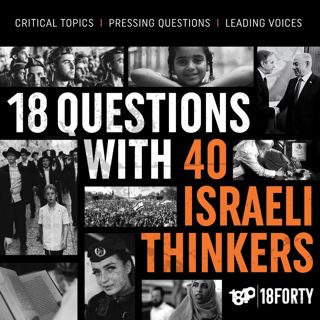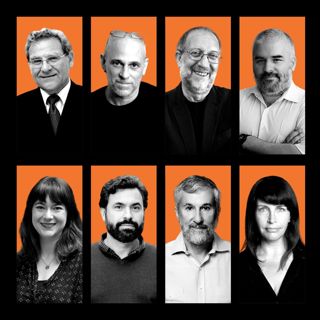
Despondent, Unmoored, Hopeful: How Israeli Thinkers Feel After October 7
How do Israeli thinkers feel after October 7?Israelis have lived in a new reality over the last year—one haunted by the horrors of the day Hamas terrorists massacred 1,200 Israelis, kidnapped 251 others, and dragged the country into an existential war.To feel October 7 one year later, we bring voices and perspectives from the Israeli thinkers we interviewed thus far to connect to their pain and their hope.
7 Okt 202434min

Rivka Ravitz: 'Being separated is at the core of being Haredi'
Rivka Ravitz may be a long-time Haredi political thinker, but that doesn't mean she thinks politics is always the answer.Since her father-in-law first employed her in the Knesset at age 18, Rivka has spend decades working in Israeli politics. She was chief of staff to President Reuven Rivlin and a senior fellow at the Jewish Public Policy Institute; now she is chief of staff to the mayor of Bet Shemesh.Rivka is intimately involved in the personal and political sphere of Haredi life—a focus of her PhD, which she is pursuing at Haifa University.Now, she joins Sruli Fruchter to answer 18 questions on Israel, including Israeli politics, the Haredi draft, and Israel as a religious state.This interview was held on Sept. 24.Here are our 18 questions:As an Israeli, and as a Jew, how are you feeling at this moment in Israeli history?What has been Israel’s greatest success and greatest mistake in its war against Hamas?How have your religious views changed since Oct. 7? What do you look for in deciding which Knesset party to vote for?Which is more important for Israel: Judaism or democracy?Should Israel treat its Jewish and non-Jewish citizens the same?Now that Israel already exists, what is the purpose of Zionism?Is opposing Zionism inherently antisemitic?Should Israel be a religious state?If you were making the case for Israel, where would you begin?Should all Israelis serve in the army?Can questioning the actions of Israel’s government and army — even in the context of this war — be a valid form of love and patriotism?What do you think is the most legitimate criticism leveled against Israel today?Do you think the State of Israel is part of the final redemption?Is Messianism helpful or harmful to Israel?Do you think peace between Israelis and Palestinians will happen within your lifetime?Where do you identify on Israel’s political and religious spectrum, and do you have friends on the “other side”?Do you have more hope or fear for Israel and the Jewish People?
30 Sep 202449min

David Stav: 'Israel as a state should not be a religious state'
Israel should not be a religious state, Rabbi David Stav says, and then its citizens could more freely welcome religion into their lives.The Chief Rabbi of Shoham, an Israeli town with a large secular populace, Rabbi Stav has long dedicated his life to bridging the social divides between religious and secular life. After the Rabin assassination, he and other rabbis founded Tzohar—an organization that "makes Jewish life accessible to secular Israelis—which received the 2009 Presidential Award for Volunteers.Rabbi Stav was previously a candidate for Israel's Chief Rabbinate and sought to revolutionize the relationship between religion and state.Now, he joins Sruli Fruchter to answer 18 questions on Israel, including democracy, IDF drafts, and Messianism.This interview was held on Sept. 11.Here are our 18 questions:As an Israeli, and as a Jew, how are you feeling at this moment in Israeli history?What has been Israel’s greatest success and greatest mistake in its war against Hamas?How have your religious views changed since Oct. 7? What do you look for in deciding which Knesset party to vote for?Which is more important for Israel: Judaism or democracy?Should Israel treat its Jewish and non-Jewish citizens the same?Now that Israel already exists, what is the purpose of Zionism?Is opposing Zionism inherently antisemitic?Should Israel be a religious state?If you were making the case for Israel, where would you begin?Should all Israelis serve in the army?Can questioning the actions of Israel’s government and army — even in the context of this war — be a valid form of love and patriotism?What do you think is the most legitimate criticism leveled against Israel today?Do you think the State of Israel is part of the final redemption?Is Messianism helpful or harmful to Israel?Do you think peace between Israelis and Palestinians will happen within your lifetime?Where do you identify on Israel’s political and religious spectrum, and do you have friends on the “other side”?Do you have more hope or fear for Israel and the Jewish People?
23 Sep 202455min

Haviv Rettig Gur: 'Hamas is upset that the death toll in Gaza isn't higher'
Until Hamas is gone, Haviv Rettig Gur says, Gaza will be unable to recover after the war.The Times of Israel journalist and political analyst has emerged as a leading voice for the Israeli public and the Jewish world for deeper understandings of the war's developments. Haviv has covered Israeli politics — domestic and foreign — for nearly two decades and speaks internationally about Zionism, the Palestinian-Israeli Conflict, and Israel's future.Haviv was previously the director of communications for the Jewish Agency for Israel, and currently teaches history and politics at Israeli premilitary academies.Now, he joins Sruli Fruchter to answer 18 questions on Israel, including the country's leadership, Western media, and the Palestinian future.This interview was recorded on Sept. 9.Here are our 18 questions:As an Israeli, and as a Jew, how are you feeling at this moment in Israeli history?What has been Israel’s greatest success and greatest mistake in its war against Hamas?Do you think Western media covers the Israel-Hamas War fairly?What do you look for in deciding which Knesset party to vote for?Which is more important for Israel: Judaism or democracy?What role should the Israeli government have in religious matters?Should Israel treat its Jewish and non-Jewish citizens the same?Now that Israel already exists, what is the purpose of Zionism?Is opposing Zionism inherently antisemitic?Is the IDF the world’s most moral army?If you were making the case for Israel, where would you begin?Can questioning the actions of Israel’s government and army — such as in the context of this war — be a valid form of love and patriotism?What do you think is the most legitimate criticism leveled against Israel today?Do you think peace between Israelis and Palestinians will happen within your lifetime?What should happen with Gaza and the Palestinian-Israeli Conflict after the war?Where do you read news about Israel?Where do you identify on Israel’s political and religious spectrum, and do you have friends on the “other side”?Do you have more hope or fear for Israel and the Jewish People?
16 Sep 20241h 21min

Yossi Klein Halevi: 'Anti-Zionism is an existential threat to the Jewish People'
What began on Oct. 7, Yossi Klein Halevi says, is not the Israel-Hamas War but the Israel-Iran War.A senior fellow at the Shalom Hartman Institute, the journalist and author has been intimately invested in Israel since he was a boy. Two of his books in particular—Like Dreamers and Letters to My Palestinian Neighbor—capture the tensions he embraces in Israel, and his own dedication to the Zionist dream. At Hartman, Yossi co-directs the Institute’s Muslim Leadership Initiative and is a long-time teacher, writer, and thinker on Israel, Zionism, and Judaism.Now, he joins Sruli Fruchter to answer 18 questions on Israel, including whether anti-Zionism is antisemitism, how Western media covers the Israel-Hamas War, the threat of Iran, and so much more.This interview was held on Aug. 28.Here are our 18 questions:As an Israeli, and as a Jew, how are you feeling at this moment in Israeli history?What has been Israel’s greatest success and greatest mistake in its war against Hamas?Do you think Western media covers the Israel-Hamas War fairly?What do you look for in deciding which Knesset party to vote for?Which is more important for Israel: Judaism or democracy?What role should the Israeli government have in religious matters?Should Israel treat its Jewish and non-Jewish citizens the same?Now that Israel already exists, what is the purpose of Zionism?Is opposing Zionism inherently antisemitic?Is the IDF the world’s most moral army?If you were making the case for Israel, where would you begin?Can questioning the actions of Israel’s government and army — such as in the context of this war — be a valid form of love and patriotism?What do you think is the most legitimate criticism leveled against Israel today?Do you think peace between Israelis and Palestinians will happen within your lifetime?What should happen with Gaza and the Palestinian-Israeli Conflict after the war?Where do you read news about Israel?Where do you identify on Israel’s political and religious spectrum, and do you have friends on the “other side”?Do you have more hope or fear for Israel and the Jewish People?
2 Sep 20241h 19min

Rachelle Fraenkel: 'I had expectations from humanity'
Rabbanit Rachelle Fraenkel has expectations from humanity. It made October 7's horror all the more terrifying.The religious figure and educator has been a voice of faith, hope, and strength for Israel and the Jewish People since her own teenaged son, Naftali, Hashem yikkom damo, was abducted and killed with Eyal Yifrach and Gilad Shaer by Hamas terrorists in 2014. Rachelle has lived, grappled, taught, and faced some of life's most haunting questions. She is a co-founder of The Jerusalem Unity Prize and Unity Day project, in honor of Naftali.Director of Matan’s Advanced Halacha Program and an educator at Nishmat, Rachelle is immersed in the world of Jewish thought and Jewish law. She previously studied at Bar Ilan University, Midreshet Lindenbaum, and Nishmat’s Keren Ariel Yoatzot Halacha Training Program, and was in the first graduating class of Matan’s Talmudic Institute. Now, she joins Sruli Fruchter to answer 18 questions on Israel, including her religious views, religiosity in Israel, and Messianism.This interview was held on Aug. 22.Here are our 18 questions:As an Israeli, and as a Jew, how are you feeling at this moment in Israeli history?What has been Israel’s greatest success and greatest mistake in its war against Hamas?How have your religious views changed since Oct. 7? What do you look for in deciding which Knesset party to vote for?Which is more important for Israel: Judaism or democracy?Should Israel treat its Jewish and non-Jewish citizens the same?Now that Israel already exists, what is the purpose of Zionism?Is opposing Zionism inherently antisemitic?Should Israel be a religious state?If you were making the case for Israel, where would you begin?Should all Israelis serve in the army?Can questioning the actions of Israel’s government and army — even in the context of this war — be a valid form of love and patriotism?What do you think is the most legitimate criticism leveled against Israel today?Do you think the State of Israel is part of the final redemption?Is Messianism helpful or harmful to Israel?Do you think peace between Israelis and Palestinians will happen within your lifetime?Where do you identify on Israel’s political and religious spectrum, and do you have friends on the “other side”?Do you have more hope or fear for Israel and the Jewish People?
26 Aug 20241h 1min

Gadi Taub: 'We should annex the north third of the Gaza Strip'
In Gadi Taub's eyes, Israel is hardly a democracy — "it's a juristocracy."The historian, activist, and public intellectual believes that there are many forces at play that threaten the Jewish state: progressivism, elitism, and Western ideals. Formerly on the left himself, Gadi is one of Israel's most popular conservative thinkers. Gadi co-hosts Tablet's Israel Update podcast and his own Hebrew podcast, Gatekeeper. Outside of those roles, he is a senior lecturer at the Federmann School of Public Policy at the Hebrew University of Jerusalem. Previously a columnist for Haaretz, he now writes for Tablet and JNS.Now, he joins Sruli Fruchter to answer 18 questions on Israel, including judicial reform, Gaza's future, and the Palestinian Authority.Here are our 18 questions:As an Israeli, and as a Jew, how are you feeling at this moment in Israeli history?What has been Israel’s greatest success and greatest mistake in its war against Hamas?How do you think Hamas views the outcome and aftermath of October 7—was it a success, in their eyes? What do you look for in deciding which Knesset party to vote for?Which is more important for Israel: Judaism or democracy?What role should the Israeli government have in religious matters?Should Israel treat its Jewish and non-Jewish citizens the same?Now that Israel already exists, what is the purpose of Zionism?Is opposing Zionism inherently antisemitic?Is the IDF the world’s most moral army?If you were making the case for Israel, where would you begin?Can questioning the actions of Israel’s government and army — even in the context of this war — be a valid form of love and patriotism?What do you think is the most legitimate criticism leveled against Israel today?Do you think peace between Israelis and Palestinians will happen within your lifetime?What should happen with Gaza and the Palestinian-Israeli conflict after the war?Are political and religious divides a major problem in Israeli society?Where do you identify on Israel’s political and religious spectrum, and do you have friends on the “other side”?Do you have more hope or fear for Israel and the Jewish People.
19 Aug 20241h 7min

Efraim Inbar: 'Israel doesn't use enough force'
Bullying isn't always a bad thing, Efraim Inbar says. In a tough neighborhood like the Middle East, sometimes it's necessary.President of the Jerusalem Institute for Strategy and Security and head of Shalem College’s program on Strategy, Diplomacy, and National Security, he speaks as a veteran Israeli political scientist and national security. In his view, Israel must be tough to stay alive—and it hasn't been tough enough.Efraim authored five books on Israeli national security and politics, and edited 14 collections of scholarly articles, and as such, he is considered an expert on Israeli strategic doctrine, public opinion on national security issues, American policy in the Middle East, Israeli-Palestinian diplomacy, and Israel-Turkey relations.Now, he joins Sruli Fruchter to answer 18 questions on Israel, including the Iranian threat, Gaza's future, and why Israel needs to act even stronger.This interview was held on August 6.Here are our 18 questions:As an Israeli, and as a Jew, how are you feeling at this moment in Israeli history?What has been Israel’s greatest success and greatest mistake in its war against Hamas?How do you think Hamas views the outcome and aftermath of October 7—was it a success, in their eyes? What do you look for in deciding which Knesset party to vote for?Which is more important for Israel: Judaism or democracy?What role should the Israeli government have in religious matters?Should Israel treat its Jewish and non-Jewish citizens the same?Now that Israel already exists, what is the purpose of Zionism?Is opposing Zionism inherently antisemitic?Is the IDF the world’s most moral army?If you were making the case for Israel, where would you begin?Can questioning the actions of Israel’s government and army — even in the context of this war — be a valid form of love and patriotism?What do you think is the most legitimate criticism leveled against Israel today?Do you think peace between Israelis and Palestinians will happen within your lifetime?What should happen with Gaza and the Palestinian-Israeli conflict after the war?Do you think Israel is properly handling the Iranian threat?Where do you identify on Israel’s political and religious spectrum, and do you have friends on the “other side”?Do you have more hope or fear for Israel and the Jewish People?
12 Aug 202444min






















